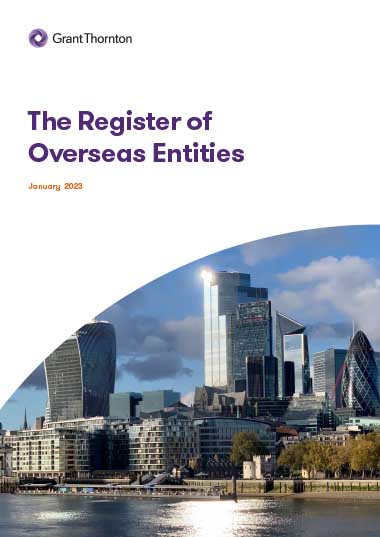-
Sector Focus
We specialise in the investment management industry offering audit, assurance, tax and corporate recovery and liquidation services.
-
Personal Tax Services
There are many tax rules that can affect you personally and therefore which will have an impact on your personal wealth.
-
QI Compliance
Qualified Intermediaries (QI) have to take action now to perform a Certification to the Internal Revenue Service (IRS).
-
Download our tax brochures
The tax teams at Grant Thornton aim to provide the Channel Islands with a premier tax advisory service both to private clients and the business community including the investment management industry.
-
Jersey Tax Return
A secure sign in page to file Jersey Tax Returns through the Grant Thornton tax portal.
-
ESG
ESG can either be seen as a risk management tool or an opportunity, either way it is imperative to your business, whatever your size and whether you are listed or not.
-
Professional Services
Business and accounting support for professional services
-
Finance Industry
We work with a broad range of clients and their financial stakeholders, from entrepreneurs in the early days to fast growing and established businesses to public companies competing in global markets.
-
Local Businesses
Businesses come in many shapes and sizes – from innovative start-ups to long-established local businesses. But however large or small your business, the chances are you face similar challenges.
-
Corporate Insolvency
Our corporate investigation, Guernsey liquidation and recovery teams focus on identifying and resolving issues affecting profitability, protecting enterprise value and facilitating a full recovery where possible.
-
Corporate Simplification
Redundant corporate entities can over complicate group structures and waste thousands of pounds in unnecessary costs each year. 46% of the c.15,500 companies controlled by the FTSE100 are dormant and it is estimated that the average cost of administering dormant companies is between £3,500 and £5,000 per company, per year.
-
Debt Advisory
Our Debt Advisory team provides commercial and financial debt advice to corporate entities and public sector bodies in a range of sectors. Our engagements include advice on stand-alone transactions and solutions or as part of an integrated business plan, in both the project and corporate arenas.
-
Exit Strategy Services
We offer a tailored methodology designed to enable a company to be reviewed in a group context to assess ways to maximise its value.
-
Financial Restructuring
For companies challenged by under-performance we work with management teams, shareholders, lenders and other stakeholders to implement financial restructuring solutions creating a stable platform for business turnaround.
-
Strategic performance reviews
Strategic performance reviews analyse the key drivers of performance improvement. Our specialists utilise a framework to evaluate financial and operational options and to identify solutions for businesses and their stakeholders.
The RoE intends to provide the UK authorities with greater visibility as to the beneficial ownership of the UK land and property title deeds that are held by entities incorporated in non-UK locations.
At a high level, there is an obligation to register where a non-UK entity owns:
- England and Wales freehold property;
- England and Wales leasehold property of at least 7 years; and
- Where the interest was acquired after 1 January 1999.
There is also an obligation to register when the entity has sold UK property since 28 February 2022.
The deadline for undertaking the registration is 31 January 2023, and Companies House estimates that c14,000 entities have registered out of a total c32,000 which may need to.
With time tunning out, it is worth noting that daily penalties can be applied where the registration is not put in place by 31 January 2023. These penalties can be up to £2,500 per day for later registration.
A critical part of the requirements involve having the information to be uploaded verified by a ‘UK based agent.’ To assist entities that need to register, UK Companies House have published a list of providers of verification services that can be contacted for assistance.
Should you still require to put a registration in place, it is recommended that this is done as soon as possible. A link to the list is noted below:
Find a UK-regulated agent to verify information for an overseas entity - GOV.UK (www.gov.uk)
The Register of Overseas Entities - What is it?
A new and publicly accessible register of overseas legal entities and their beneficial owners which own UK land and property. Overseas legal entities include companies, partnerships and also any other entity that is a ‘legal person’ under the relevant governing law. Whilst trusts will generally not be covered, there is a separate reporting regime that applies to trusts in some circumstances. Failure to comply with the new requirements can have serious consequences, including affecting the ability of the legal entity to buy and sell, and to create charges over, UK land.
How will it be implemented?
Registration is required in relation to both newly acquired UK land, and many existing holdings of UK land.
The register went live on 1 August 2022, and overseas legal entities have until 31 January 2023 in order to make the necessary registrations and submit the required information.
The requirement to comply exists where land was acquired in England and Wales on or after 1 January 1999, in Scotland on or after 8 December 2014, and after 1 August 2022 in Northern Ireland. There are specific rules covering what constitutes ‘owned’ for these purposes – a leasehold in England and Wales of at least 7 years will be sufficient.
Disposals of UK land made by overseas legal entities after 28 February 2022 will also need to be notified in the register.
What information needs to be provided?
Registrations from overseas legal entities must include the following:
- A statement concerning the information provided about the registrable beneficial owners;
- A further statement that the overseas entity has complied with its duty to take steps to identify beneficial owners, together with details as to why this may not be possible;
- Any further information required under separate regulations which may be issued in the future; and
- The name and contact details of a person who may be contacted about the registration.
Certain specified information about the entity must also be provided such as its address, country of incorporation/formation, legal form etc.
Individuals and legal entities will be registrable beneficial owners if they meet one or more of the following conditions, and are not exempt for any other reasons:
- They directly or indirectly own 25% of the shares in the overseas entity;
- They directly or indirectly own more than 25% of the voting rights of the entity;
- They hold the right to appoint or remove the majority of the Board;
- They have the right to exercise, or do exercise, significant influence or control over the entity.
There are also specific provisions to include bodies which are not themselves legal entities (e.g. trustees of a trust) as registerable beneficial owners where they meet the above listed conditions.
The information that requires to be disclosed for individuals will be certain personal details such as date of birth, residential address, nationality and whether the individual is affected by any sanctions.
There is also a specific list of information which requires to be disclosed for other legal entities and trusts which may be registerable beneficial owners. The information required in relation for trusts can be particularly onerous, as there can be a requirement to provide details of all settlors, grantors, beneficiaries, trustees, and other persons who hold certain powers over the trust, which can also include protectors.
Are there annual obligations to be met?
Annual updates or confirmation that there are no reportable changes will be required. The deadline for this is 14 days from the end of each year, based on the anniversary date of the overseas entity first registering. The annual update must either:
- Confirm it has no reasonable cause to believe that any registerable beneficial owner has become or ceased to be such during the update period; or
- Provide details and relevant dates of each person who became or ceased to be a registrable beneficial owner during the update period.
Are there penalties for non-compliance?
Where there is a failure to comply with the registration requirements, it will affect an overseas entity’s ability to buy and sell UK land, and can affect the ability to create a charge (e.g. mortgage) over owned land. Daily penalties of up to £2,500 can be applied for non-compliance.
Failure to update the register or provide required information on an annual basis will constitute a criminal offence which may result in financial penalties and in serious cases, imprisonment.



